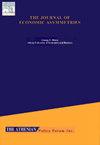Asymmetric impacts of geopolitical risks on energy Trade: Divergent vulnerabilities in emerging vs. advanced economies
Q1 Economics, Econometrics and Finance
引用次数: 0
Abstract
This study investigates the system-wide consequences of rising geopolitical risks (GPR) on global energy trade, emphasizing asymmetric vulnerabilities between emerging market economies (EMEs) and advanced economies (AEs)—a critical gap in existing scholarship. Combining autoregressive distributed lag (ARDL) modeling and impulse response analyses on 55 countries (1990–2023), we assess how geopolitical tensions disrupt energy trade dynamics, accounting for global volatility and domestic economic conditions. Our findings uncover marked asymmetries: while geopolitical risks persistently suppress energy trade, with long-term effects outweighing transient shocks, EMEs are disproportionately destabilized due to their heavy reliance on energy exports and weaker institutional capacity. AEs, conversely, demonstrate greater resilience through diversified economies, strategic reserves, and policy flexibility, though post-2008 geopolitical fragmentation and financial instability intensify disruptions across all economies. Impulse response simulations reveal that geopolitical shocks trigger sharper declines in energy trade flows for EMEs, with steeper and more prolonged contractions than AEs. Compounding these unequal burdens, escalating trade taxes strain EMEs’ fiscal stability and energy security, whereas AEs deploy fiscal buffers to cushion shocks. By exposing how geopolitical risks cascade through energy systems, the study underscores the urgency of multilateral cooperation to address structurally embedded asymmetries, particularly the fragility of EMEs in global energy frameworks.
地缘政治风险对能源贸易的不对称影响:新兴经济体与发达经济体的不同脆弱性
本研究探讨了不断上升的地缘政治风险(GPR)对全球能源贸易的全系统后果,强调了新兴市场经济体(eme)和发达经济体(ae)之间的不对称脆弱性——这是现有学术研究中的一个重大缺口。结合自回归分布滞后(ARDL)模型和对55个国家(1990-2023)的脉冲响应分析,我们评估了地缘政治紧张局势如何破坏能源贸易动态,考虑到全球波动和国内经济状况。我们的研究结果揭示了明显的不对称性:地缘政治风险持续抑制能源贸易,其长期影响超过短暂冲击,而新兴市场由于严重依赖能源出口和较弱的制度能力而不成比例地不稳定。相反,发达国家通过经济多元化、战略储备和政策灵活性表现出更强的抵御能力,尽管2008年后地缘政治碎片化和金融不稳定加剧了所有经济体的破坏。脉冲响应模拟显示,地缘政治冲击引发新兴市场国家能源贸易流量急剧下降,收缩幅度更大、持续时间更长。不断升级的贸易税加剧了这些不平等负担,给新兴市场国家的财政稳定和能源安全带来压力,而发达国家则利用财政缓冲来缓冲冲击。通过揭示地缘政治风险如何在能源系统中层叠蔓延,该研究强调了多边合作解决结构性不对称的紧迫性,特别是新兴市场在全球能源框架中的脆弱性。
本文章由计算机程序翻译,如有差异,请以英文原文为准。
求助全文
约1分钟内获得全文
求助全文
来源期刊

Journal of Economic Asymmetries
Economics, Econometrics and Finance-Economics, Econometrics and Finance (all)
CiteScore
4.80
自引率
0.00%
发文量
42
审稿时长
50 days
 求助内容:
求助内容: 应助结果提醒方式:
应助结果提醒方式:


